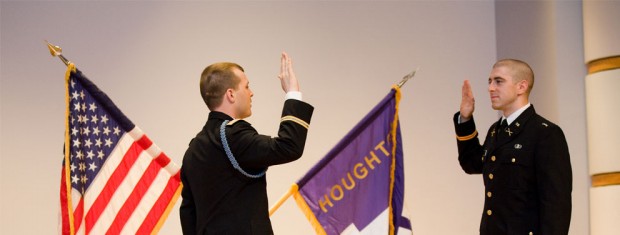Bowing his head over the chapel pulpit on Monday, November 11, Michael Jordan gave thanks for the sacrifices of those in the military, confessed the mistakes of this and every country, and asked earnestly for peace. His prayer observed Veteran’s Day and the Canadian Remembrance Day. Also, whether intentionally or not, it honored those at Houghton involved in the military while showing respect for those here with pacifist convictions. This is a necessity for a college that strives to offer support to individuals with ties to the military but also to recognize those who have other perspectives on Christian involvement in the military.
“The Christian tradition as a whole has within it two long standing traditions regarding the use of violence and the military—pacifism and just war theory,” explained Shirley Mullen, president of the college. “As a Christian college, I believe we have a responsibility to familiarize students with both of those traditions.”
One way the college does this, while providing for the needs of students in or aspiring to join the military, is through the Reserve Officer Training Corp (ROTC) program. The ROTC program on campus began in the late 70s, following years in which Houghton students participated in ROTC through St. Bonaventure University.
“The benefits [of ROTC] are too great in number to achieve an accurate count,” said Alyssa Kiser, a senior cadet in the Houghton ROTC program. Formerly part of a high school JROTC unit, Kiser said “[JROTC] taught me to be honest, be courageous, and how to be proud of not only my achievements, but the achievement of the team working together to reach a goal.” Kiser said the benefits of her college ROTC involvement include “a four-year scholarship awarded right out of high school (for contracted cadets), a monthly stipend (for contracted cadets), relationships with people from all over the United States and abroad, a guaranteed job after graduation, and skills that will last a lifetime.”
Others at Houghton do not share this enthusiasm about ROTC. “There have been some in our community and some in our alumni constituency who believe that we should not have ROTC on campus,” Mullen commented. “My own position on this is the following: If we were a college of one of the Peace Denominations, then we would not have ROTC…But the Wesleyan Methodist denomination has historically had within itself both pacifist and just war advocates. So our denomination does not dictate our position on this issue…In supporting ROTC, I have always encouraged our ROTC group to be proactive in creating a forum where these issues can be discussed. So that the presence of ROTC is, itself, an educational opportunity for students at a Christian liberal arts college.”
Connie Finney, professor of education, is among those who question the role of ROTC at a liberal arts college. Finney described herself as “not personally against the military, but…against some of the ways it functions.” While making it clear that she respects and cares about the individuals involved in the ROTC program, Finney commented “The ROTC program being housed at a Christian liberal arts college is a bit puzzling to me in the sense that my understanding of the military is that you are not encouraged to be an independent thinker – you are encouraged to follow orders. It would be difficult to have a well-functioning military otherwise. This does not, in my mind, seem consistent with liberal arts thinking.”
Whatever their views on Christians in the military, Houghton students, faculty and staff are generally supportive of individual members of the college community who are involved with the military. The support takes various forms. It may be prayers in chapel and elsewhere. It may be, as Kiser described, “excusal from classes in understanding of training events for the military, attendance at military functions, silence when performing in color guards (the parading of the National flag), and not disgracing the personnel in uniform.” It may be the respect which John Van Wicklin, faculty advisor for ROTC, said “starts from the President of the College and works its way down.” It may be former ROTC advisor Robert Danner’s challenge to Houghton cadets: “that they be good leaders in the Army, and good witnesses for Christ…”

